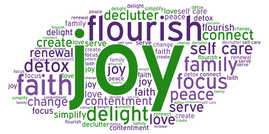 How can I help? I heard Dr. Max Goodwin speak those four simple words for a final time earlier this week. For non-viewers of the television series New Amsterdam, Max was the medical director of a fictional public hospital in New York City. When Max arrived, New Amsterdam Hospital was struggling with its finances, with a lack of shared vision, and with how to serve the population for which it was created—people on the margins without access to health care. Over five seasons, the goal of leading the hospital to become the best it could be drove Max—even if it meant he needed to break the existing system to help create something new. At the heart of what Max tried to do were four simple words: "How can I help?" Sometimes Max crossed boundaries or made missteps as he attempted to respond to the answers he received, but he never stopped asking the question. During the series finale—which was titled "How Can I Help?"—viewers learned that Max first heard those four simple words as a five-year old sitting in a hospital hallway while his sister was dying in a nearby bed. A nurse kneeled down to young Max and asked him that question. Those four simple words set Max on the path to becoming a doctor. They became the north star that would guide him through life.
2 Comments
 I believe that every true adventure is filled with discoveries. The experience that Elder Care Ministries recently shared with grandparents and grandchildren was just such an adventure. Over five days and four nights we discovered things about ourselves, our families, God, the world, and the joy of sharing discoveries with others. During A Grand Adventure: Stories, Steps & Stars our group took three discovery hikes led by Rev. Jonathan Malone; shared found objects and stories about our lives; reflected on how stars can remind us about God’s creation, promises, and guidance; created artwork and lit luminaries; and shared delicious meals prepared by Beth Hollis and her staff. Grandparents and grandchildren also had free time to visit the beach; pick blueberries; read books; stop for donuts; and play indoor and outdoor games.  Several weeks ago I preached for one of our congregations. During that Sunday’s children’s time, I asked, “Do you like change?” When a girl nodded her head yes, I asked what she likes about change. She responded, “You can buy things with it.” She was right. That’s one way to think about change. But I hope we can agree that change is more than the coins in our pockets. Over a recent lunch, three of our region’s pastors talked about their upcoming retirements, which represent significant change in their lives and those of their congregations. One pastor noted that the baptisms she performed on Palm Sunday were the final ones she would do in her current setting, but they also might be the last ones she ever will do. Each pastor speculated about what the future might hold—especially during the initial months of retirement. We also talked about how the region might best support them as they transition through this time of change and how the region’s staff might work with their congregations as they begin transitioning through changes of their own.  If you’re a regular listener to NPR’s Morning Edition, you know that Friday morning means an installment from StoryCorps. During the 18 years since its founding, this oral history project has taped more than half a million Americans telling their stories. It’s the largest single collection of human voices ever recorded, and it has one simple goal. “What if we just give the entire country the chance to be listened to and have a chance to talk about, you know, who they are?” explains StoryCorps founder Dave Isay. He adds that being told that all of our stories matter equally and infinitely is something everyone needs to hear. While StoryCorp interviews involve people who know each other, the interviews in Isay’s new initiative—One Small Step—match strangers from across the political divide. In both programs, the central aim is to encourage people to listen to one another. Studies show that on the average people only remember a fraction of what is said to them. So what is it that makes listening such a challenge?  I have a friend who recently began reading lots of fiction. More than once she has mentioned being amazed that authors can weave the stories she is reading. And yet my friend is a wonderful storyteller. Over and over I’ve heard her tell a story—often from her past—that helps make sense of or casts a new light on something we’re discussing. Her stories are more helpful to me than any sets of facts she might recite. I grew up in a storytelling family. I later would learn that we were part of what is often called an oral culture. My sister and I were the first in our large extended family—except for one uncle—who went to college. That doesn’t mean that members of my family weren’t gifted or bright. We simply used different tools to make sense of the world. As I became educated in the literate culture of academia, I still loved and relied on stories. It’s probably no accident that I gravitated to journalism—a field in which I could get paid to write the stories I heard and observed. Later that same love of stories guided me to study narrative theory—especially as it applies to organizations, including congregations.  There are few things I enjoy more than listening to people tell stories. This past week I had two splendid opportunities to do just that. On Sunday afternoon I led a program for one of our congregations. People sat around tables in groups of four or five and told stories. The stories were about experiences at the church when people felt most alive, most connected, or most spiritually touched. The stories were about what people valued about and received from that congregation. I heard stories about community and belonging; about worshiping, studying, and praying together; and about diversity and acceptance. There also were stories about stepping up and serving; about laughter and love; and about compassion and working together despite disagreements. On Wednesday morning I co-facilitated a Zoom focus group about ABCORI ministries at Canonicus. With great energy and excitement, participants told stories about their experiences at Canonicus. A grandmother told about exploring the grounds as she walked and her young grandsons rode their bikes. A 90-year-old shared about coming to Canonicus when he was ten and finding a respite from the Great Depression. Several participants told stories about experiencing spiritual renewal. Other stories focused on the beauty and calming nature of the place. In both instances, the storytelling drew the storytellers together. While the individual experiences were different, the shared stories reminded those gathered—in person and virtually—of what they had in common.  I recently read a fascinating interview with Debbie Sterling. You may not be familiar with her name. I wasn’t either. Sterling is the founder and CEO of GoldieBlox, a company that creates interactive toys and shows to introduce girls to science, technology, engineering, and math. An engineer herself, Sterling began her company by producing building kits designed for girls ages 4-9. Each kit came with a storybook about a kid inventor named Goldie and her friends and gave a reason for building what was in the box. “We found in testing that boys enjoyed building just for the sake of building, then knocking it against the wall and building it up again,” said Sterling, “whereas girls were more interested in the story: Why are we building this thing? Who it is for, and how is it going to help?” It was Sterling’s comment about the importance of story that caught my attention.  A friend of mine selects a word at the beginning of each year to help guide her through the coming twelve months. She gives her selection much more thought than I’m guessing most of us do to any resolutions we might make. Her word for 2021 was renewal. It captured her hope to renew friendships, activities, mind, body, and spirit. As I was reflecting on what word I might select for the coming year, I learned of the death of Archbishop Emeritus Desmond Tutu. My mind jumped to thinking about what word I would connect with this great hero of faith. I’ve heard several commentators suggest the word ubuntu. It represents an African concept in which one’s sense of self is shaped by one’s relationships with other people. It’s a way of living that begins with the premise that “I am” only because “we are.”  We’ve made it. We’ve reached the end of our Advent journey. But where do we find ourselves this Christmas Eve? Are we with the shepherds out in the fields, minding our own business, waiting for the night to end? When the glory of the Lord bursts in around us here tonight, will we see it? Or will we be too terrified? Or has our journey led us—along with the shepherds—to Bethlehem? And once there, will we dare to take the final step that will bring us face to face with the Christ whose coming we have awaited?  Our Advent journey nears its end. We long to reach our destination. Detours and delays at this point seem like more than mere annoyances. Nothing must stop us from reaching our journey’s end on schedule and according to plan. Joseph had a plan in mind also, didn’t he? Being a righteous man who was unwilling to expose his pregnant fiancée to public disgrace, Joseph planned to dismiss her quietly. This was not a harsh or malicious plan. In fact, considering the circumstances, Joseph’s plan was quite noble. But just as Joseph mapped out the final steps of his plan, God introduced a change of direction. |
Kathryn PalenAssociate Executive Minister Archives
January 2023
Categories |
 RSS Feed
RSS Feed